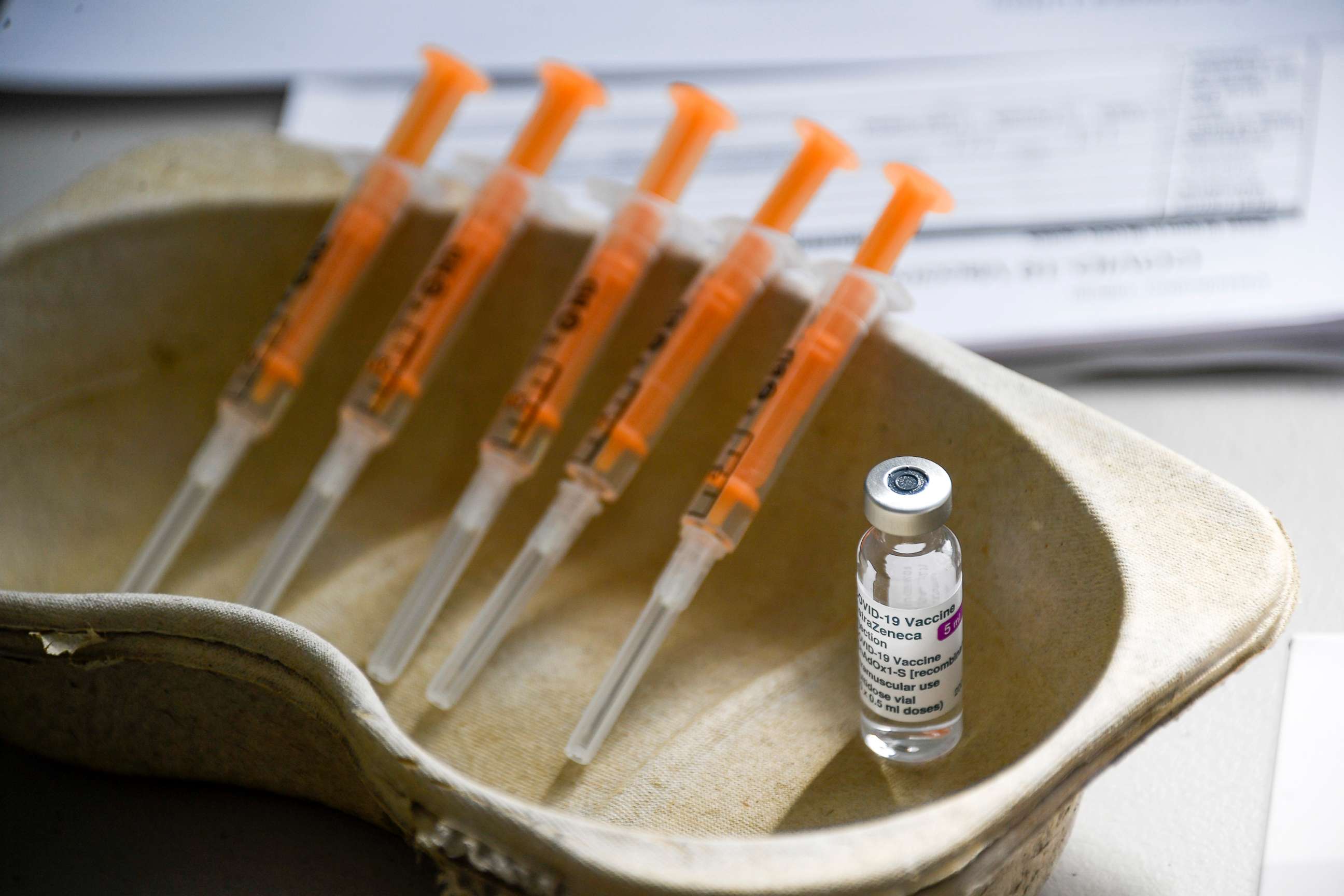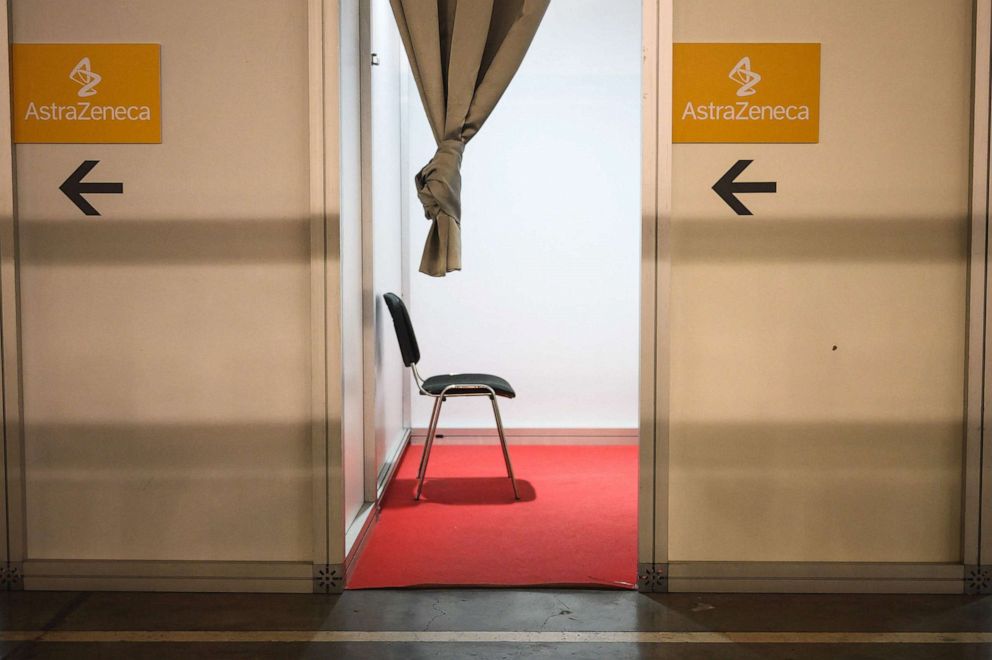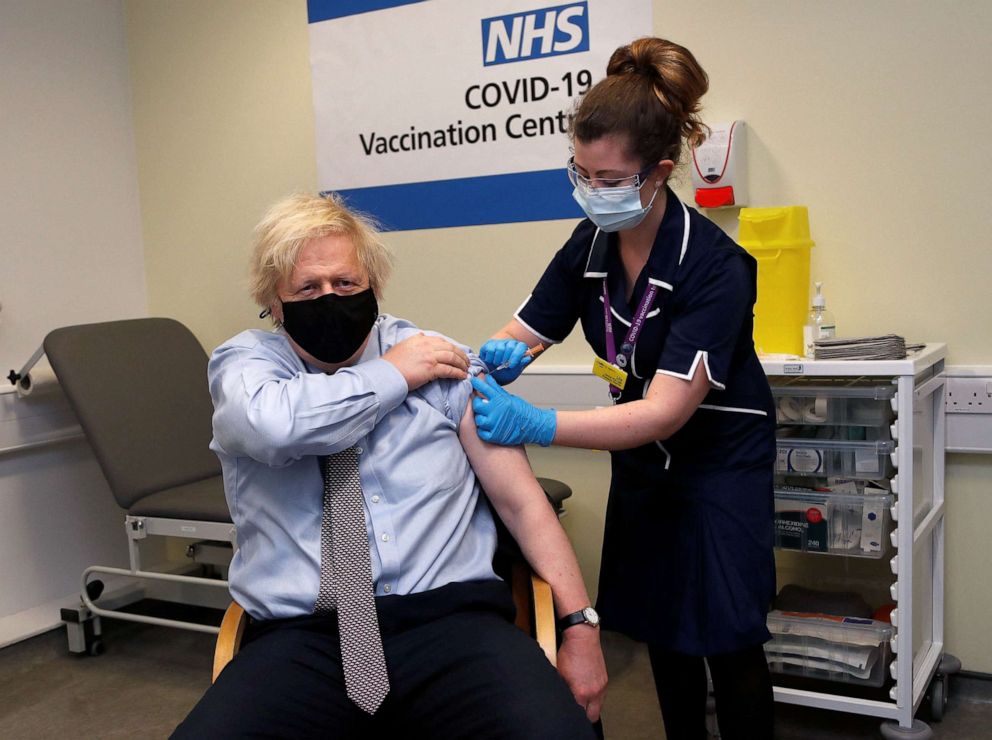US data shows AstraZeneca vaccine effective against COVID-19 for all adults
The U.S. has pre-ordered 100 million doses of the AstraZeneca vaccine.
LONDON -- Long-awaited preliminary data from final-stage testing in the United States of a COVID-19 vaccine developed by England's University of Oxford and British-Swedish pharmaceutical giant AstraZeneca shows the two-dose shot is highly effective in all age and ethnicity groups, stopped hospitalization in all cases and did not raise the overall risk of blood clots.
The Oxford/AstraZeneca vaccine was 79% effective in stopping symptomatic disease and 100% effective at preventing severe disease and hospitalization, AstraZeneca said in a statement Monday. The data was shared in anticipation of peer-reviewed publication in the near future.
The vaccine is effective across multiple age groups, the data showed. Previous trials conducted in the United Kingdom, Brazil and South Africa did not include a sufficient number of participants over 65 years old, so the data for how well the vaccine works for that demographic had been lacking until now.
"It's exciting to see similar efficacy results in people over 65 for the first time," Ann Falsey, professor of medicine at the University of Rochester and a principal investigator for the U.S. trial, said in a statement.

Several European countries had halted using this vaccine last week due to a concern that it might be causing blood clots. However, after an investigation into a handful of deaths from thrombosis that occurred after vaccination the World Health Organization and the European Medicines Agency (EMA) both found the vaccine to be safe and effective. However, the EMA said the vaccine may be associated with certain rare types of blood clots, including those in which there are low levels of blood platelets, which help the blood to clot.
For the U.S. trial, the Data Safety Monitoring Board (DSMB) "found no increased risk of thrombosis or events characterized by thrombosis among the 21,583 participants receiving at least one dose of the vaccine."
"We are confident this vaccine can play an important role in protecting millions of people worldwide against this lethal virus," Mene Pangalos, head of AstraZeneca's non-oncology research and development, said in a statement.
The company's U.S. president, Roud Dobber, told CNBC on Monday that the current plan is to file for the authorization in the first half of April.
"We hope to deliver 30 million doses instantly after the EUA for Americans to get vaccinated, of course then it's in the hands of the FDA," Dobber said.
AstraZeneca will follow the same approval process and timeline as the other three vaccine producers. Once it has submitted its data, the FDA will independently review it and hold a public hearing, followed by a non-binding vote by an independent review board. After that the FDA will decide to authorize its use or not. Given that timeline, the most likely time this vaccine could be available in the U.S. is May.
The U.S. trial recruited 32,000 volunteers at 88 trial centers in the US, Peru and Chile. Participants came from all age groups and approximately 79% were Caucasian, 8% African American, 4% Native American, 4% Asian and 22% Hispanic. The volunteers received either two standard doses of the Oxford-AstraZeneca vaccine or a placebo vaccine, at a four-week interval.
"These new results from the large phase III trials in the US, Chile and Peru provide further confirmation of the safety and effectiveness of [the AstraZeneca vaccine]," Sarah Gilbert, professor of vaccinology and co-designer of the vaccine, said.
Professor Adrian Hill, director of Oxford University's Jenner Institute for Vaccine Research, pointed out that the trial was successful in older adults in a clinical setting. He said this confirmed what researchers had previously only observed through "surveillance data from the vaccine and deployment."
"So this is really ticking the boxes and completing the story," he told ABC News Live.

But will this data be enough to convince those that are hesitant to take this vaccine?
A new poll conducted by YouGov, which quizzed about 8,000 people in seven European countries between March 12 and 18, the period that use of the vaccine was halted, showed that there was an increasing trend in people thinking this vaccine is unsafe and a dramatic decrease in confidence in the AstraZeneca vaccine compared with previous surveys conducted in February.
Experts like John Brownstein, chief innovation officer and professor at Harvard Medical School, hope Monday's results could help shift the dial on AstraZeneca's acceptance rating.
"These data could serve to improve the vaccine's reputation globally and combat much of the hesitancy that has arisen after the recent safety scare," Brownstein said. "If these data can pass FDA scrutiny, approval will likely enhance trust in the vaccine where the shot is already authorized and provide reassurance to countries who have yet to authorize the vaccine."
The timeline of AstraZeneca receiving emergency use authorization has some questioning whether there is a real need for this vaccine in the U.S.
"With supply unlikely available before May, it's unclear whether this vaccine will have a measurable impact on vaccine rollout in the US." Explains Brownstein, "By that time, we will already have enough vaccine for all 260M adults."
The US has pre-ordered 100 million doses of the AstraZeneca vaccine and the Biden administration is preparing to send millions of doses to Mexico and Canada.
"I can confirm that we have 7 million releasable doses available of AstraZeneca," White House press secretary Jen Psaki told reporters at a White House press briefing last Thursday. "2.5 million of those, we are working to finalize plans to lend those to Mexico and 1.5 million to Canada."
The AstraZeneca vaccine is easy to transport and store, needing only standard refrigeration and because of this and, its low price, it was destined for many lower income countries. AstraZeneca's manufacturing and distribution plan aims to make the vaccines with partners all over the world, keeping distribution as local as possible.
However, it hasn't gone completely smoothly for this vaccine process -- since Oxford University and AstraZeneca first released their phase 3 trial data it has been beset with problems. Experts were left confused by the trial's parameters, and how the data was presented, especially as they combined two sets of efficacy results to create an average of 70% efficacy.
It later emerged these trials had followed two different dosing regimens, after a dosing error. The first used two regular doses and reached 62% efficacy. The second had a lower dose, followed by a regular dose, with an efficacy of 90%, researchers said.
Questions began to emerge about how they collected and presented the data, including why researchers used two dosing regimens and whether the results can be combined into an average. It also transpired that no one from the most vulnerable 65 years plus demographic was tested using the more effective dosing regimen.
But despite this somewhat confusing data, the Medicines and Healthcare products Regulatory Agency in the U.K., the European Medicines Agency, and the World Health Organization all approved this vaccine for use late last year and early this year. Some European countries, however, were reluctant to use it on people over 65 years old, citing insufficient data.

There have also been major disagreements between Ursula Von Der Leyen, the president of European Commission and AstraZeneca after problems at a factory led to a significant decrease in its supply to the continent. Further compounding this mixed picture is the fact that this vaccine was also been shown to be less effective against the South African variant with South Africa announcing last month that it would not use the vaccine in its rollout.
With the release of today's data from the trials in the U.S., Chile and Peru, the hope is that doubts surrounding this vaccine will be removed, "The latest data for AZD1222, aka the Oxford/AstraZeneca vaccine, is as good as we have come to expect" notes Ian Jones, professor of virology at the University of Reading, "The vaccine clearly works and the ill-informed suspension of use in some countries over concerns about blood clotting has since been shown to be unfounded."
"The simple truth is that any backbiting over the dose or lack of transparency in the data is all in the past ... there is no risk in taking them but a whole lot of risk from a continuously circulating SARS-CoV-2 virus. It's a classic no brainer, the vaccines work, take them," he said.




